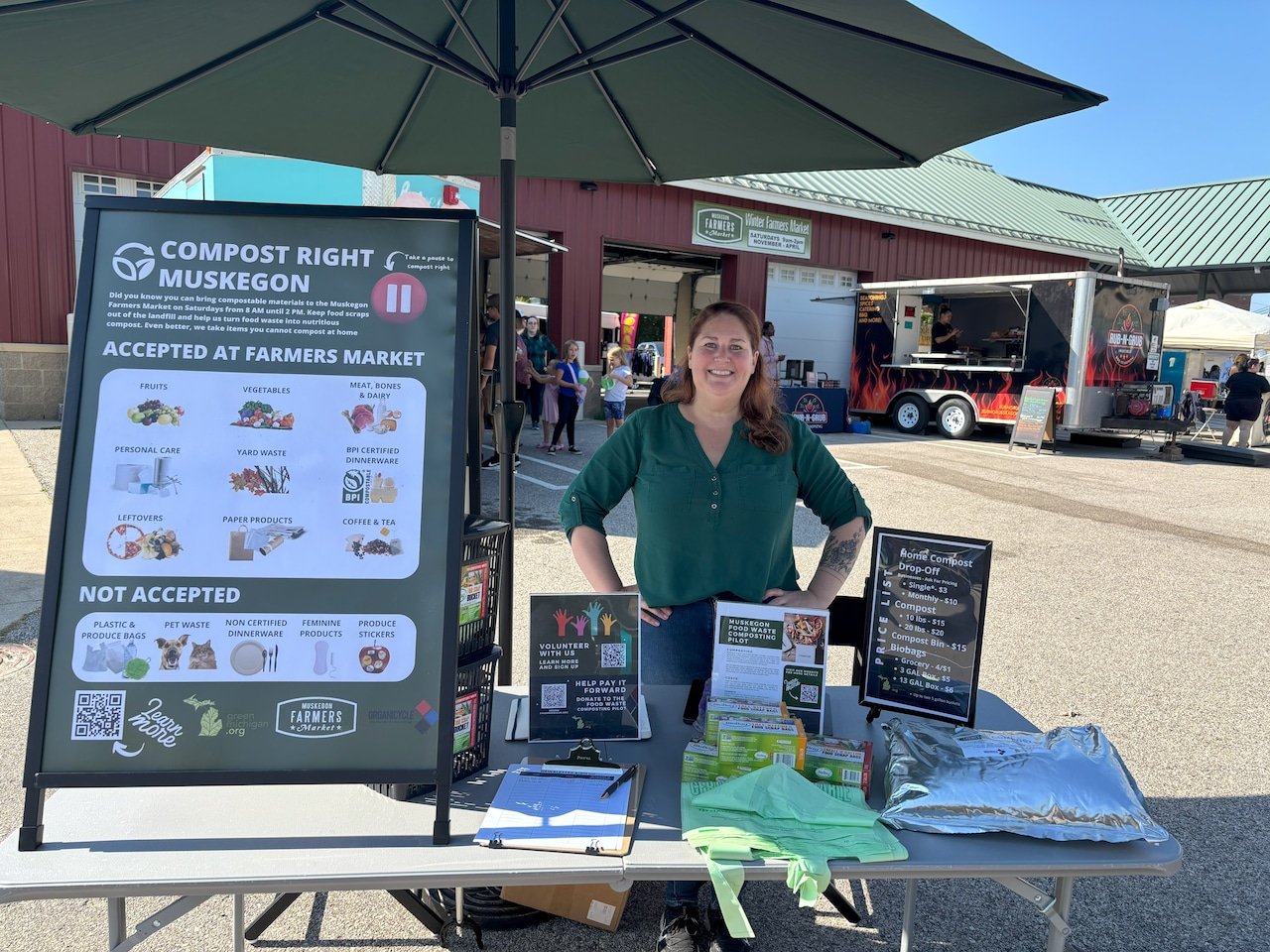MUSKEGON, MI – A newly launched composting initiative at the Muskegon Farmers Market has succeeded in diverting one ton of food waste from local landfills within its first month of operation. The program, managed by Green Michigan, a nonprofit organization aimed at promoting sustainability in West Michigan, allows residents to drop off food scraps for composting at a nominal fee.
Angela Fox, the program’s director, has been running this weekly composting service at the bustling downtown market.
“Out of all the wicked problems related to sustainability, food waste is one of the easier problems to solve,” Fox remarked, noting that issues such as air and water quality tend to be more complex. Her booth, easily recognizable under a green umbrella, is located at the heart of the farmers market every Saturday from 8 a.m. to 2 p.m. at 242 W. Western Ave.
Residents are encouraged to bring their food scraps in various containers, including five-gallon buckets, paper bags, and compostable bags. Fox reassures participants, “We don’t care if it’s mixed together, we don’t care if it smells. Sometimes you’re going to get creepy crawlies – we don’t care about that either. However you get it to us is however you get it to us.”
However, there is one important restriction: no plastic.
Fox emphasized, “no plastic,” as it introduces contamination that complicates the recycling process. The composting program accepts a wide range of items, such as:
- Fruits
- Vegetables
- Meats
- Bones
- Dairy
- Personal care products (cotton swabs, toilet paper, paper towels, face tissue)
- Yard waste
- BPI-certified dinnerware
- Leftovers
- Paper products
- Coffee and tea grounds
In contrast, the program prohibits items such as:
- Plastic and produce bags
- Pet waste
- Non-certified dinnerware
- Tea bags
- Produce stickers
Previously, Fox managed a free composting initiative in Royal Oak and identified one major challenge: contamination. Many users mistakenly added non-compostable items, like plastic, to the mix. To mitigate this issue, she introduced a small fee structure.
“When you attach money, it adds value,” Fox explained. “People see the value and do take it seriously.”
Despite her passion for the program, Fox currently funds the initiative out of her own pocket, covering all supplies and the costs associated with the composting company, Organacycle, for an initial four-month pilot phase. “As long as we can cover our costs by the end of those four months, and if I can have one Saturday off a month, then maybe we can make it a permanent addition to the market,” she said. The monthly operational costs are approximately $1,000.
To support the initiative, Fox has recruited three volunteers so far and is eager to welcome more. Anyone aged 12 and older can join the effort, and those who complete a three-hour shift receive free composting for one month. The cost for a single drop-off of up to two five-gallon buckets is $3, while for $10 a month, individuals can drop off unlimited amounts, a plan that has resonated with frequent farmers market attendees.
Green Michigan is actively pursuing grants from the Muskegon Community Foundation and the state to further support the program. “I’m hoping to get funding to make this a free program or, at least, reduce the cost,” Fox stated.
Surprisingly, Fox discovered that not many residents have signed up for Muskegon’s existing free recycling program, saying, “There just hasn’t been the demand or it’s not simple enough for people to sign up.” However, she has encountered a thriving community of “backyard composters” in the area.
“That is a good surprise,” Fox said. “Our program can supplement that with the things they can’t put in their pile – meat, dairy, bones.”
This thriving composting initiative aims to enhance local sustainability efforts while fostering community engagement around waste reduction and environmental education. As Muskegon embraces a greener future, initiatives like this are vital to changing perceptions of waste and building a more sustainable community.






